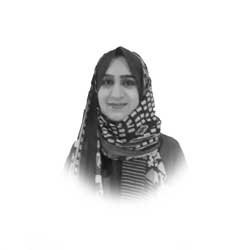By: Nayab Iqbal
There is a dire need to improve the representation of disabled-individuals in politics and decision-making positions.
The International Day for Persons with Disabilities is celebrated to promote equal participation, and opportunities for individuals with disabilities, and to remind the world to take some concrete actions for building inclusive societies. This year, the day is commemorated with a theme “Building Back Better” to ensure inclusiveness, and accessibility for disabled-individuals in a post-Covid-19 world.
Identifying and acknowledging the struggles of disabled individuals, such as limited access to education, employment, and development opportunities as a result of the ingrained bias towards them is the preliminary step in this regard. As a society, we must collectively recognize and consciously unlearn the deep-rooted intolerance that is often displayed when including individuals with disabilities in mainstream activities or while assigning them challenging roles and responsibilities. Only then we can empower them, and provide them with equal chances for representation, growth, and development, which will help them unleash and utilize their true potential.
We must begin by promoting an environment of inclusion in schools. Children from primary age must be taught to respect and coexist with individuals with different needs as this will help eliminate discrimination, and promote inclusiveness in the long run. When children with and without disabilities learn together, they learn to appreciate and value the differences between them from a young age. Similarly, equal higher education opportunities must be provided for individuals with disabilities along with building campuses that are sustainable and disability-inclusive. Often individuals with disabilities are intentionally or unintentionally left behind due to a lack of complete access to school and college campuses. From sports grounds to the main auditorium, campuses must be easily accessible for disabled individuals so they have chances for becoming active and equal participants in all activities. If students with disabilities have an interest in activities like sports, then a proper coaching and mentor facility must be available for them.
Once they graduate, people with disabilities must have access to better employment opportunities. Employers must hire individuals based on their competency for contributing to their organization’s missions and development goals, and disabled individuals with relevant skillsets must not be discriminated against while hiring and promoting. According to an estimate, less than 1 in 5 disabled individuals are employed, and as per the Census data on median earnings, in developed nations, disabled individuals earn $9000 less a year as compared to non-disabled employees. One can only imagine the severity of the situation in developing and underdeveloped countries. Since economic development is inextricably linked to empowerment, for building inclusive societies, it is crucial to ensure equal earning opportunities for disabled individuals.
In addition to this, there is a dire need to improve the representation of disabled-individuals in politics and decision-making positions. Including more number of disabled-individuals in decision-making positions will facilitate in devising disability-friendly policies, and eliminating different forms of discrimination, inequality, and injustices that exist against them. Disabled-individuals must also have opportunities for entering into the mainstream media. Having them in diverse roles like acting, directing, and anchoring will help shift the narrative around disability while normalizing diverse and challenging career options for differently-abled individuals.
For promoting sustainability, along with disability-friendly school and college campuses, it is also essential to promote accessibility for such individuals within public spaces. From having disability-accessible restrooms and private spaces in malls, and public parks, to ensuring disability-friendly air travel, all steps shall be taken to build inclusive societies. We must acknowledge the fact that the basic needs and challenges of people with disabilities remained unaddressed for decades and a post-pandemic world is our chance to rebuild society in ways that it is more accessible, inclusive, and sustainable for a diverse group of individuals.
The writer is a Ph.D. scholar and an educationist by profession. Currently, she works as an English Lecturer and a Freelance Writer. She can be reached on Twitter @NayabIqbal12.








